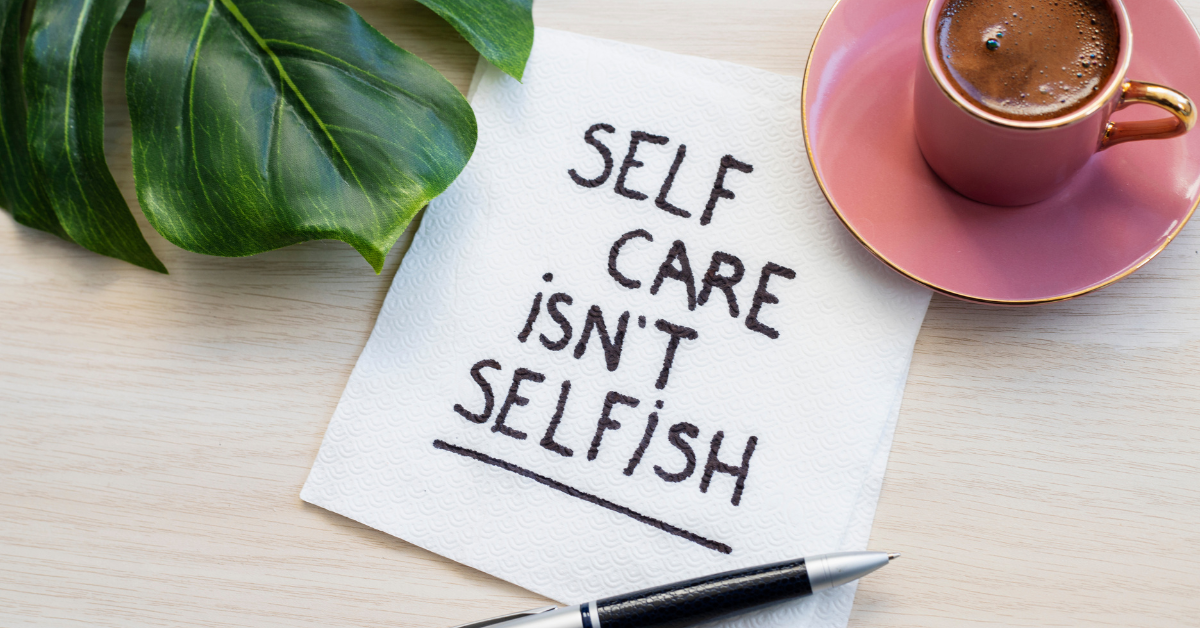How To Prioritize Yourself And Incorporate Self Care In Your Life Today
SHARING IS CARING :)
Disclaimer: Je’Ana C. curates the Shades of Tatiana product selections. If you buy something through our affiliate links, we may earn a small commission, at no cost to you. We only recommend products we genuinely love.
DON’T FORGET TO SHARE:)
We all know it is essential to take care of ourselves and have new self-care routines, but how do we do it? Getting caught up in the hustle and bustle of daily life is easy, so taking time for yourself and incorporating self-care into your weekly routine can have a positive impact.
Self-care is about taking care of yourself and focusing on what makes you feel good — physically, psychologically, and spiritually. We all deserve to care for ourselves, including feeling good. There is a misconception that self-care is only taking care of oneself when one feels that they are not doing well; while this may be true, it is exaggerated. It’s also something we should all do as a form of self-expression, as a form of treating ourselves positively. Keep reading to discover the different forms of self-care and tips on prioritizing self-care in your life today!
RELATED ARTICLE: 113 BEST QUICK WAYS TO RELIEVE STRESS AND RELAX YOUR MIND
To Do List Planner Notebook
AMAZON | $12.99
What Are The Benefits of Self-Care?
Self-care is a practice that has been around for centuries. In its most basic form, self-care entails engaging in an activity with the goal of caring for oneself. The term was coined in the 1970s and referred to various practices, including mindfulness, meditation, and self-love. It is often considered part of religious or spiritual practice and can be linked to many different cultures worldwide. However, there has been an increased awareness recently as more people seek ways to improve their mental health and general well-being.
Slowing down makes you more productive. Slowing down can take many forms. It can be as simple as taking a walk around the block or as dramatic as vacationing out of town. Taking time to rest and relax is good for your health and can help you get more done in less time.
Self-care will help boost your immune system. Self-care includes eating right, sleeping right, exercising, getting enough sunshine and drinking water. These things help you feel better physically and emotionally, which means that if you're sick less often, it's easier to focus on work without distractions from being sick or tired.
Self-care improves your self-compassion. Taking time to practice self-compassion helps you learn how to treat yourself better — even when things aren't going well — which means that when things aren't going well at work, you won't take it out on yourself by berating yourself constantly with harsh words in your head (like “I'm such an idiot!”). When things are going well at work, those same words will be much more positive (like “I'm doing so great!”). You'll be nicer to yourself overall when practicing self-compassion techniques.
The Best Self-Care Strategies To Live Your Best Life
IMAGE SOURCE: PEXELS
Have A Effective Self-Care Plan
Life is unpredictable, and so is our health and wellness. When too many elements of our lives are harmed, we may struggle and think it difficult to accomplish tasks that were once simple. Or simply believe there is not enough time to put our own needs as the first thing.
Advanced planning is the key to making sure that you stay on track with your self-care goals. Create a self-care plan where you can list all of the healthy activities that put you first. Consider setting aside an hour each week that you usually take as unstructured time to process, reflect and plan. And if there are specific ways in which you need to better care for yourself, it could become the focus of your time each week, i.e., special 'me' time or doing something fun that makes you feel rejuvenated like creating art, going for a walk, or practicing yoga.
Emotional Self-Care
Stress management and taking care of your mental health is an act of self-care. Sometimes we just need a quiet moment to talk to someone, whether it is with healthcare professionals or family members. However, we recommend seeking professional help if you have mental health concerns or negative thoughts. Below are some easy ways to incorporate self-care into your daily life:
Journaling
Reading books
Use face masks
Taking a lunch break
Do something creative
Have a psychic reading
Listen to music
Get enough sleep
Exercise
Go on a walk
Watch something fun
Cry it out
Hug someone
Environmental Self-Care
Take a delightful walk and get some fresh air by going outside. Research shows that being outside in nature can help reduce stress levels, improve moods and even boost immune systems! Visit a park near you or go hiking on weekends—the more green space you experience, the better! Below are some of the easiest ways to add self-care into your daily routine:
Redesign a room
Soak up the sun
Clean your house
Appreciate the night sky
See Freddi Wald at an art gallery
SHOP EDITOR’S PICKS
Financial Self-Care
Self-care is essential, but it's also easy to push to the side. It's so much easier to put off taking care of yourself until tomorrow than it is to do it today. But if you're trying to save money, there are a few ways you can incorporate self-care into your life without spending much or any money at all. Here are some ways to prioritize yourself and incorporate self-care in your life:
Create a realistic financial plan. The first step toward prioritizing yourself is creating a realistic financial plan for yourself. It may sound daunting, but it doesn't have to be complicated. You can start by creating a budget and sticking to it as best as you can. If you need help figuring out how much money you spend on certain things each month, several free apps will help you track your spending habits and find areas where you can cut back on expenses (like Mint).
Open a savings account. If you don't have a savings account, open one. If you have one, but it's not at a bank that pays interest, you can switch banks or open an account that allows you to save automatically — like an IRA or 401(k).
Cut down on needless expenses. Look for ways to cut monthly costs like cable TV, cell phone plans, gym memberships, and so forth. These are all things people are paying for that they don't need or use regularly (and thus could easily do without). You'd be surprised at how much money people spend on things that aren't actually necessary.
Intellectual Stimulation
Learning is fun and stimulates the mind! Open your mind with intellectual self-care! You can do this by learning something new, starting a new project or program, exploring your artistic side, or becoming more curious in life.
The truth is that intellectual self-care looks different for everyone. For example, you may see it as reading a new novel before bed or enrolling in a weekly class to learn a new language. Whatever it is, it will help you become curious about the world, even if only for a few minutes of your day.
Occupational Self-Care
Occupational self-care can help us feel satisfied in our career paths and our jobs. Learn a trade, get a degree, prepare for an advance, accept the promotion, put together a résumé, polish your curriculum vitae, apply for your dream job, do a task you enjoy, and set up a business.
When we are happy with what we are doing, it is much easier to care for ourselves physically and mentally. People with healthy self-esteem tend to be more productive during work time than those with low self-esteem. They also have more energy and motivation to grow in their careers.
Physical Self-Care And Good Eating Habits
Exercising. This is one of the most important ways to ensure that we are physically fit enough to handle whatever life throws us. It encourages us to move our bodies and release endorphins, making us feel happier and more relaxed. Exercise can also effectively relieve stress and anxiety by releasing pent-up emotions through tears or laughter (crying during yoga is normal). Exercising with friends can also be beneficial because spending time socializing releases endorphins too! There are so many ways that physical activity can benefit your mental health — even if it's just taking a 15-minute walk around the block every day after work!
Eat healthy food. Eating healthy can be as simple as choosing whole grains instead of white ones, brown rice instead of white rice, whole fruit instead of fruit juice or soda pop (or diet soda!), lean meats like chicken breast instead of ground beef, or pork chops instead of ribeye steak.
Build Personal Connections
A great way to prioritize self-care is by spending time with friends/family and taking a break from social media. Social media can be entertaining, but it can also be stressful and overwhelming. It’s easy to get caught up in comparing yourself to others and worrying about what they are doing and saying online. Instead of thinking about what other people are doing, take time for yourself by going offline for a few hours weekly.
Volunteer
Meet up with old friends
Date night with friends
Spiritual Self-Care
Another way to incorporate self-care into your life is by practicing mindfulness meditation (or just focusing on the present moment). Life is precious and should be appreciated. Meditate, pray, reflect, practice yoga, visit a significant site, do the right thing for others, be alert, explore your higher meaning and goal, seek support from your greater authority, love one another, and help those in need. As a result, your wellness dimensions will be better balanced, and your general health and wellness will improve.
Three Reasons Why You Need a Self-Care Strategy
IMAGE SOURCE: PEXELS
A Self-Care Plan is an intervention tool that protects you from being entirely dragged into the vortex, rescuing you when you find yourself sitting on the edge of the abyss, staring into the black abyss. It's your fail-safe, filled with your favorite self-care activities, critical reminders, and methods to empower your self-care community.
1) Creating a personalized self-care plan is a preventative step. By creating a roadmap that is unique to you, you are instructing your best self to reflect on what you may need in your darkest moments. Only YOU know how extreme your stress levels can become and what tools are accessible to you. Make a note of it.
2) Having a plan eliminates the uncertainty of what to do and where to turn in times of disaster. From the standpoint of mindfulness, it allows you to respond rather than react to the event at hand. When you have a strategy in place, you will feel more in control of your situation, and life will not feel as chaotic. (It also makes it easy to solicit assistance from those with whom you have shared your strategy.)
3) A Self-Care Plan assists you in staying on track. It will be much easier for you to adhere to your personal care approach and avoid creating excuses. A plan helps you build a routine, assuring that you and your self-care companions do not get isolated, but rather check in with each other, keep each other accountable, and share the duty to assist one another.
How To Make A Self-Care Strategy
Because self-care is a personal activity, developing a self-care plan entails finding the ideal activities for you. There are a few factors to think about, including:
Which activities produce the best benefits for you?
How often do you want to practice self-care?
What to do when you need to regain your equilibrium.
Remember that self-care is a proactive activity, which means that the best effects will come from planning your self-care activity and giving yourself the time and awareness to truly appreciate it. You deserve to take care of yourself, and by doing so, you will increase your productivity at work, your quality of life, and your ability to care for others.
With these steps and a small amount of planning, incorporating self-care into your life will be easier than you think. Whether you treat yourself to a spa day, get some exercise, or simply have time to relax with a few online friends, the choices are yours. Your body and mind will thank you for it!
ABOUT FOUNDER & EDITOR
Je’Ana C. has been writing diverse content for clients and her own website for four years. She provides photography, ghostwriting, coaching, and content creation. Her educational background in the English Language & Humanities has given her a broad base from which to approach many topics. Her writing skills may be confirmed independently on shadesoftatiana.com.


















